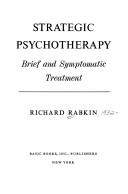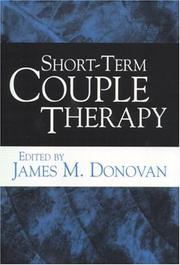| Listing 1 - 10 of 177 | << page >> |
Sort by
|
Book
ISBN: 152648160X 1526436418 1526481596 9781526481603 9781526436412 9781526481597 Year: 2019 Publisher: London, England : SAGE Publications Ltd,
Abstract | Keywords | Export | Availability | Bookmark
 Loading...
Loading...Choose an application
- Reference Manager
- EndNote
- RefWorks (Direct export to RefWorks)
This essential guide offers a step-by-step guide to applying a range of contemporary and popular brief treatments, suitable for a range of client groups and professional settings. Following a comprehensive introduction to the use of brief interventions in therapeutic practice, each chapter provides an introduction to the theoretical underpinnings and evidence-based of a brief intervention, followed by guidance as to how to implement the approach with useful ′top tips′, worksheets and examples from practice through case vignettes illustrating its application.
Book
Year: 1970 Publisher: St. Louis, Mo., : W. H. Green,
Abstract | Keywords | Export | Availability | Bookmark
 Loading...
Loading...Choose an application
- Reference Manager
- EndNote
- RefWorks (Direct export to RefWorks)
Een naslagwerk waarin eerst de theorie ... en vervolgens de praktijk van de psychotherapie uitgelegd wordt aan de lezer(es).
Book
ISBN: 1118713702 1118713672 1118713680 Year: 2022 Publisher: John Wiley & Sons, Inc.
Abstract | Keywords | Export | Availability | Bookmark
 Loading...
Loading...Choose an application
- Reference Manager
- EndNote
- RefWorks (Direct export to RefWorks)
The first edition of this book, Existential Time Limited Therapy: The Wheel of Existence (Strasser & Strasser, 1997), co-authored by my father, Freddie Strasser, and me, paved a pathway to describing how existential therapy offers an effective approach to brief therapy where 'it was the certainty of the ending that was identified as the most influential distinguishing factor' (Lamont, 2012, p. 172). We proposed that time itself is the 'tool' that facilitates awareness and the potential for change. One of the original aims of the first edition was to convey existential philosophy as a vehicle for common sense. Neither my father nor I saw ourselves as experts in existential philosophy; however, we were both stimulated by how the integration of existential and phenomenological philosophies added alternative perspectives and ways of understanding people that related to their concrete living in the world rather than being limited to a psychological perspective. As is probably true for most existential practitioners, we saw ourselves as existential-oriented therapists, signifying that we are informed by numerous ideas and approaches that build on our own personal experiences
Book
ISBN: 1845906039 9781845906030 Year: 2006 Publisher: Bancyfelin : Crown House,
Abstract | Keywords | Export | Availability | Bookmark
 Loading...
Loading...Choose an application
- Reference Manager
- EndNote
- RefWorks (Direct export to RefWorks)
Discussing ways in which to utilise the power of expectation in working with clients, this text argues that creating an environment where the client expects to change is the foundation of doing effective very brief therapy.

ISBN: 0465082173 Year: 1977 Publisher: New York (N.Y.) : Basic books,
Abstract | Keywords | Export | Availability | Bookmark
 Loading...
Loading...Choose an application
- Reference Manager
- EndNote
- RefWorks (Direct export to RefWorks)
Book
ISBN: 143382776X 9781433827761 Year: 2017 Publisher: Washington, DC: American psychological association,
Abstract | Keywords | Export | Availability | Bookmark
 Loading...
Loading...Choose an application
- Reference Manager
- EndNote
- RefWorks (Direct export to RefWorks)
In this concise volume, Hanna Levenson revisits the history, theory, and practice of brief dynamic therapy. This integrative approach uses techniques from attachment theory, interpersonal neurobiology, affective-experiential learning, and systems orientations to help clients with dysfunctional ways of relating to others.This Revised Edition includes updated case examples, as well as new research findings--including process-outcome studies that affirm treatment effectiveness, and new research on the "reconsolidation process" that demonstrates how sudden, dramatic change happens in brief dynamic therapy.
Book
ISBN: 1526447665 9781526447661 Year: 2018 Publisher: London : SAGE Publications Ltd,
Abstract | Keywords | Export | Availability | Bookmark
 Loading...
Loading...Choose an application
- Reference Manager
- EndNote
- RefWorks (Direct export to RefWorks)
This timely new edition describes how to use cognitive behaviour therapy successfully with clients in a brief, time-limited way.After reading this book therapists will be able to provide effective help to clients suffering from a wide range of disorders, including anxiety, depression, obsessive-compulsive disorder and post-traumatic stress, or those who are suicidal. Following an explanation of brief therapy and the theory behind cognitive behaviour therapy, the authors outline strategies for helping clients overcome unhelpful beliefs and thought patterns though all stages of counselling. Using illustrative case material throughout, the updated book includes: - extra practical material for the client and therapist to use during the counselling process - a brand new chapter on brief CBT in groupwork - expansion of discussion on counselling suicidal clients within a brief CBT framework. Every trainee psychotherapist should own a copy of this book, and it is important reading for all new health professionals working in the NHS and private practice.

ISBN: 1572304316 Year: 1999 Publisher: New York Guilford
Abstract | Keywords | Export | Availability | Bookmark
 Loading...
Loading...Choose an application
- Reference Manager
- EndNote
- RefWorks (Direct export to RefWorks)

ISBN: 0429910479 0429896247 0429471475 1283125021 9786613125026 1849401926 9781849401920 1855751070 9781855751071 Year: 1995 Publisher: London Karnac Books
Abstract | Keywords | Export | Availability | Bookmark
 Loading...
Loading...Choose an application
- Reference Manager
- EndNote
- RefWorks (Direct export to RefWorks)
This book aims to describe and explain the bias against brief psychotherapy, whilst stressing the importance of actively challenging resistance and working through the transference. It also covers the positive use of anger - even from the first session. As a group analyst concerned with social and psychological issues, Dr Angela Molnos brings a unique perspective to bear on the problems raised, both for society and the individual, by the confusion and the prejudice surrounding HIV infection and the Aids epidemic. Recognizing that these problems can vitiate even the most enlightened health care policies, she draws on her experience gained by working in several countries to put the case for the application of group analysis, through the organization of staff support groups, to those directly concerned with policy implementation; The carers themselves. In the first part of her book Dr Molnos demonstrates how, if unchecked, conscious and unconscious prejudice can promote destructive tendencies within the groups involved with HIV and AIDS patients.
Book
ISBN: 0471956112 Year: 1995 Publisher: Chichester Wiley
Abstract | Keywords | Export | Availability | Bookmark
 Loading...
Loading...Choose an application
- Reference Manager
- EndNote
- RefWorks (Direct export to RefWorks)
| Listing 1 - 10 of 177 | << page >> |
Sort by
|

 Search
Search Feedback
Feedback About UniCat
About UniCat  Help
Help News
News